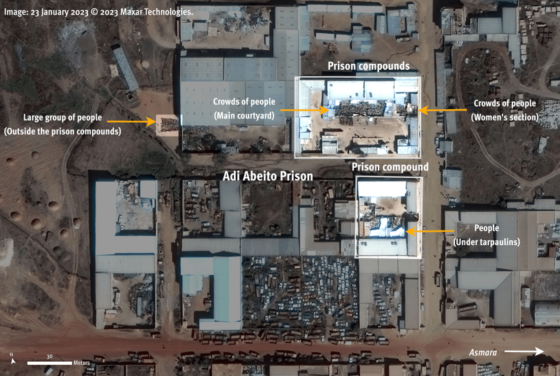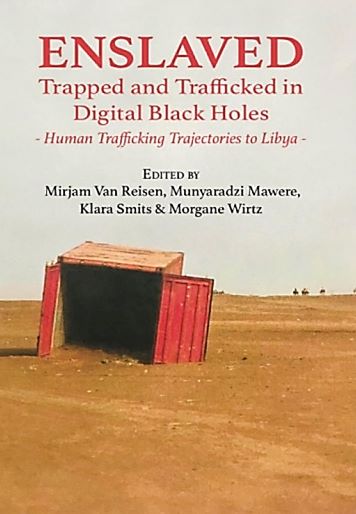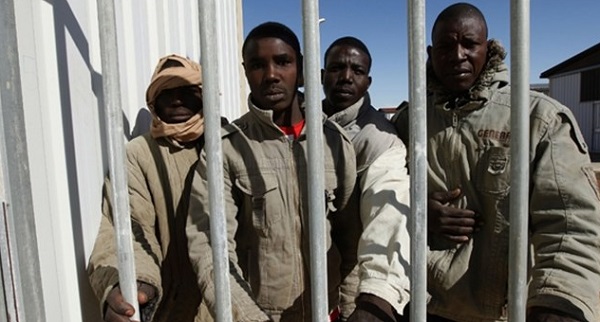U.S. Weighs Offering Economic Lifeline to Ethiopia Despite War Atrocities
Saturday, 11 March 2023 22:25 Written by Martin Plaut
The internal administration debate comes ahead of Blinken’s plans to visit Africa. Source: Foreign Policy MARCH 9, 2023, 5:37 PM The Biden administration is weighing plans to lift restrictions on aid and financial assistance to war-battered Ethiopia in a move that has drawn backlash from human rights advocates and some factions within the administration. The plan, if confirmed, is expected to be announced by Secretary of State Antony Blinken during an upcoming visit to the Ethiopian capital of Addis Ababa later this month, according to multiple current and former officials familiar with the matter. The debate playing out within the administration over its Ethiopia policy reflects a concern among top aid and human rights officials as well as lawmakers in Congress that U.S. President Joe Biden hasn’t done enough to acknowledge or hold Ethiopia accountable for atrocities, ethnic cleansing, and possible war crimes it committed during a devastating two-year war against the Tigray People’s Liberation Front (TPLF) rebel group in the country’s northern Tigray region. That war cost hundreds of thousands of lives and destabilized Africa’s second-most-populous country. “The U.S. very likely knows the nature of the crimes and the extent to which the government of Ethiopia at the top levels ordered the violence on its own civilians,” said one former senior U.S. official familiar with the matter, who spoke on condition of anonymity to discuss the internal administration deliberations. “Mass killing never stays buried. Everyone in the victim community and the atrocity-prevention community will remember which U.S. policymakers made this call to ignore its own information and move forward with these economic packages.” This policy debate was described to Foreign Policy by five current and former officials, all of whom spoke on condition of anonymity to discuss sensitive internal government deliberations. Some officials—including Biden’s top envoy for African affairs, Molly Phee, and Victoria Nuland, undersecretary of state for political affairs—are pushing for the administration to begin renormalizing ties with Ethiopia after a peace agreement was signed to end the war in November 2022. Officials in the camp for reviving relations argue that the move is necessary for U.S. engagement across Africa, given Ethiopia’s outsized economic and political influence on the continent. They also argue that Ethiopia’s economy is teetering on the brink and only international assistance such as loans from the International Monetary Fund and debt restructuring can help repair the war-torn economy. Blocking the Ethiopian government from sorely needed economic relief after it signed a peace deal, these officials argue, could ultimately undermine the fragile peace and overall stability in the country. Officials in the other camp, including U.S. Agency for International Development (USAID) chief Samantha Power, have argued in internal policy debates that the administration needs to extract more commitments from the Ethiopian government on human rights and accountability for war crimes and other atrocities before agreeing to fully open access to economic and trade lifelines. “We should not trade our long-held values on human rights for perceived near-term stability in East Africa,” said Cameron Hudson, an expert on U.S. Africa policy at the Center for Strategic and International Studies. “The question is how much does this administration think they can achieve across the region without having Ethiopia as a strategic partner?” The State Department declined to comment, and USAID did not respond to a request for comment. The Ethiopian Embassy in Washington also did not respond to a request for comment. Among the policy proposals administration officials are discussing are supporting plans for an International Monetary Fund loan to restructure the country’s debt, lifting restrictions on some U.S. aid that had been halted during the war, and eventually allowing Ethiopia to rejoin the African Growth and Opportunity Act (AGOA) trade pact with the United States. AGOA provides African countries with duty-free access to U.S. markets. The Biden administration cut Ethiopia out of AGOA in January 2022 for “gross violations of internationally recognized human rights being perpetrated by the Government of Ethiopia and other parties amid the widening conflict in northern Ethiopia.” Between November 2020 and November 2022, the Ethiopian military and forces from neighboring Eritrea fought a war in Ethiopia’s northern Tigray region against the TPLF, a guerrilla force and former ruling political party in Ethiopia. The conflict was marked by widespread atrocities on all sides. Forces from Ethiopia and Eritrea were accused of war crimes including mass rape, sexual slavery, torture, and extrajudicial killings of civilians. The war may have killed as many as 600,000 people, as some peace mediators estimated, which would make it the deadliest conflict of the 21st century. The Ethiopian government and TPLF signed a peace deal, brokered by the African Union, in November 2022 to end the conflict. The peace accord brought immediate relief to the country but sidestepped critical issues to end the cycle of violence. Left unanswered were questions on when, if at all, Eritrean forces would leave Tigray and whether the Ethiopian government would completely lift its de facto blockade on Tigray that left millions without access to humanitarian aid. Many Western officials and aid workers are also worried about a spike in violence in Ethiopia’s Oromia region—separate from the settlement of the conflict in Tigray—that risks further destabilizing the country and kick-starting another cycle of violence. Some human rights advocates and U.S. lawmakers have criticized the Biden administration for not holding Ethiopian Prime Minister Abiy Ahmed’s government to account for the human rights violations committed during the war and say Washington should use its economic and political levers of power more forcefully to cement and expand the peace deal. “Yes, the agreement brought some relief to a population that was suffering for too long. But let’s be clear that five months on, the suffering continues,” said Sarah Yager, the Washington director at Human Rights Watch, a nonprofit advocacy organization. The administration set up new sanctions authorities in September 2021, specifically for the Ethiopia conflict, but it has so far only used that authority to sanction Eritrean officials for their role in the conflict. Human rights advocates have also criticized the administration for withholding a formal atrocities designation on Ethiopia. Blinken in March 2021 stated that acts of “ethnic cleansing” had been carried out in the conflict in Ethiopia. The State Department drafted a declaration in 2021 that the Ethiopian government’s atrocities in Tigray constituted a genocide, according to three U.S. officials familiar with the matter, but it never released the declaration. The State Department, these officials said, played an important role in facilitating the peace talks between Ethiopia and the TPLF and has brought up concerns on human rights violations in virtually every meeting with senior Ethiopian officials over the course of the conflict. But Yager said there’s more to be done. “The reality is that any peace is tenuous at best without credible investigations and accountability for what’s been committed there, past and present,” Yager said. “We want to see U.S. officials take seriously how fragile Ethiopia is at this moment and why its people need to see justice. History has never looked kindly on the papering over of horrors of this magnitude.” |
|
Eritrea. Liberty Magazine Issue Nr.78
Friday, 03 March 2023 21:22 Written by EPDP Foreign Office AffairsPress Release Eritrean Political Forces (EPF)
Tuesday, 14 February 2023 20:39 Written by Eritrean Political Forces Diplomacy CommitteeEritrea: Crackdown on Draft Evaders’ Families
Thursday, 09 February 2023 22:02 Written by Martin Plaut
|
Eritrean Torture Survivors Lose Appeal for Asylum Status in Israel
Wednesday, 08 February 2023 22:23 Written by Martin Plaut
|
Somalia-Eritrea-Ethiopia: how human trafficking brought 200,000 to Libya and slavery
Wednesday, 08 February 2023 22:13 Written by Martin Plaut
|
Russia reveals its plans for relations with Eritrea
Tuesday, 31 January 2023 21:22 Written by Martin Plaut|
|
Martin Plaut posted: " Lavrov Announces Creation of Framework for Russia-Eritrea Trade Consultations Lavrov: Russia and Eritrea have agreed to create a mechanism for trade consultations MASSAWA (Eritrea), 27 JAN- RIA Novosti Russia and Eritrea have agreed to est" Martin Plaut |
Lavrov Announces Creation of Framework for Russia-Eritrea Trade Consultations Lavrov: Russia and Eritrea have agreed to create a mechanism for trade consultations MASSAWA (Eritrea), 27 JAN- RIA Novosti Russia and Eritrea have agreed to establish an interdepartmental framework for consultations on matters related to trade and economics. According to Russian Minister of Foreign Affairs Sergei Lavrov, both countries will work to insulate their partnership from the ongoing effects of Western sanctions. "We have a mutual interest in developing cooperation in the area of trade and economics. We have agreed to set up a bilateral framework for consultations between the relevant departments that will address economic, trade and investment issues," Lavrov told journalists. He likewise noted that both nations will promote direct contact between their respective business communities "that have shown an interest in pursuing joint projects in the mining industry, energy sector, agricultural sphere and information communication technologies, among others." "Of course, at the same time," the foreign minister concluded, "we will look into what concrete steps can be taken to shield our partnership from illegitimate Western sanctions." |
Eritrea and Russia sign memorandum linking Russia’s naval base with Massawa
Wednesday, 18 January 2023 22:38 Written by Martin Plaut
Citing an announcement by Eritrean Ambassador to Russia Petros Tseggai, state media outlet RIA Novosti reports that the Red Sea port city of Massawa has signed a memorandum of understanding with [Black Sea naval base] Sevastopol. According to Tseggai, an official exchange of delegations is already planned as the two countries seek to develop closer ties. The ambassador likewise noted that he visited Crimea and Sevastopol during the Soviet era and that the peninsula has seen only positive change since returning to Russian control [in 2014]. Eritrea is an East African nation with an agricultural based economy and a growing industrial mining sector. Its capital Asmara enjoys a reputation among tourists as being the safest on the African continent. The RIA Novosti report cited in the above video: Source: 8 January 2023, RIA Novosti) Massawa and Sevastopol Sign Agreement of Cooperation Eritrean Ambassador to Russia Petros Tseggai: Port city Massawa and Sevastopol have signed a memorandum of understanding MOSCOW, 8 JAN- RIA Novosti In an interview [today] with RIA Novosti, Eritrean Ambassador to Russia Petros Tseggai announced that the Eritrean Red Sea port city of Massawa and Sevastopol have signed a memorandum of understanding. In addition, an official exchange of delegations is scheduled. “We have signed a memorandum of understanding between the ports of Massawa and Sevastopol,” Ambassador Tseggai said. “I would like to see something come out of this collaboration.” He noted that an official exchange of delegations is already planned as the two countries seek to develop closer ties. “People in our country have yet to fully appreciate the promise of such a partnership,” the Eritrean diplomat added. “We will have an official exchange of delegations and this will develop.” Ambassador Tseggai said that he visited Crimea during the Soviet era when he was a student in Odessa, and that Sevastopol made an impression on him at that time. “I visited Alushta as a student. Now it (Crimea) has improved a lot. During the Soviet era it wasn’t bad either. I was in Sevastopol, which I'm told was completely destroyed during the Second World War. Both (British Prime Minister Winston) Churchill and others said it wouldn’t be rebuilt even in 70 years,” noted the ambassador. |
How the notorious Eritrean trafficker, Kidane Zekarias Habtemariam, was finally brought to book
Saturday, 14 January 2023 20:48 Written by Martin Plaut
|





























